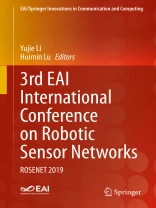This proceedings presents the papers of the 3rd EAI International Conference on Robotic Sensor Networks (ROSENET 2019). The conference explores the integration of networks and robotic technologies, which has become a topic of increasing interest for both researchers and developers from academic fields and industries worldwide. The authors posit that big networks will be the main approach to the next generation of robotic research, The book discusses how the explosive number of network models and increasing computational power of computers significantly extends the number of potential applications for robotic technologies while also bringing new challenges to each network’s community. The conference provided a platform for researchers to share up-to-date scientific achievements in this field. The conference took place August 17, 2019, Kitakyushu, Japan.
- Presents the proceedings of the 3rd EAI International Conference on Robotic Sensor Networks (ROSENET 2019), August 17, 2019, Kitakyushu, Japan
- Features papers on robotic technologies for healthcare, medicine, military and more
- Includes perspectives from a multi-disciplinary selection of global researchers, academics, and professionals
表中的内容
Introduction.- Blood Vessels Image Segmentation Based on Clifford Algebra and Voronoi Diagram.- Reinforcement Learning Based Cell Intelligent Multi-mode Frequency Reuse Method.- Image Registration Method for Temporal Substraction Based on Salient Region Features.- Extreme ROS Reality: A Representation Framework for Robots Using Image Dehazing and VR.- Double-Blinded Finder: A Two-Side Privacy-Preserving Approach for Finding Missing Children.- Complex Object Illumination Transfer through Semantic and Material Parsing and Composition.- Global-best Leading Artificial Bee Colony Algorithms.- Position Control of Ultrasonic Motor using PID Control Combined with Artificial Bee Colony Type Neural Networks.- An Adaptable Feature Synthesis for Camouflage.- Conclusion.
关于作者
Yujie Li received the B.S. degree in Computer Science and Technology from Yangzhou University in 2009. She received M.S. degrees in Electrical Engineering from Kyushu Institute of Technology and Yangzhou University in 2012, respectively. She received a Ph.D. degree from Kyushu Institute of Technology in 2015. From 2016 to 2017, she was a Lecturer in Yangzhou University. Currently, she is a JSPS research fellow (FPD) at Kyushu Institute of Technology and an Assistant Professor in Fukuoka University, Japan. Her research interests include computer vision, sensors, and image segmentation.
Huimin Lu received a B.S. degree in Electronics Information Science and Technology from Yangzhou University in 2008. He received M.S. degrees in Electrical Engineering from Kyushu Institute of Technology and Yangzhou University in 2011. He received a Ph.D. degree in Electrical Engineering from Kyushu Institute of Technology in 2014. From 2013 to 2016, he was a JSPS research fellow (DC2, PD, and FPD) at Kyushu Institute of Technology. From 2017 to 2019, he was an assistant professor in Kyushu Institute of Technology, Japan. Currently, he is an associate professor in Kyushu Institute of Technology and an Excellent Young Researcher of MEXT-Japan. His research interests include computer vision, robotics, artificial intelligence, and ocean observing.












